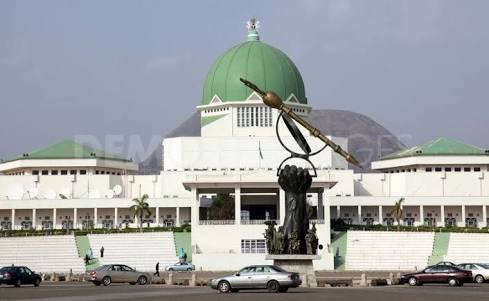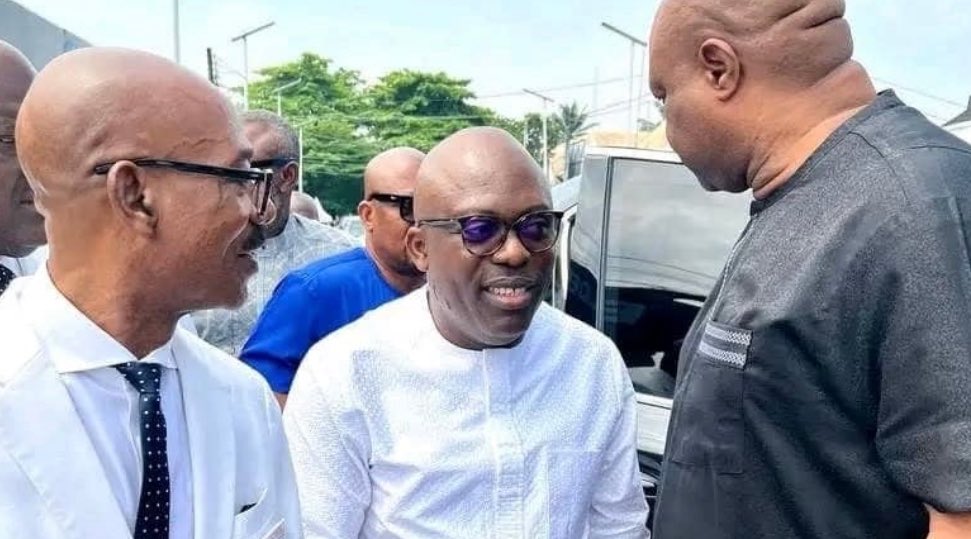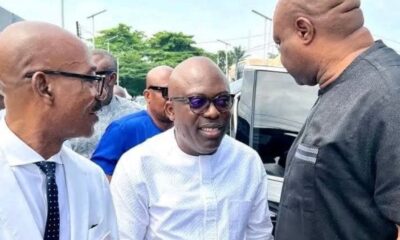NEWS
NASS Can Review Upwardly Or Reduce Budget Estimates, Court Rules

NEWS
JUST-IN: Gov Fubara returns to Port Harcourt as Tinubu ends Emergency Rule

Rivers State Governor, Siminalayi Fubara, returned to the state on Friday, landing at the Port Harcourt International Airport, Omagwa, at about 11:55 a.m. to the cheers of his supporters who trooped out to welcome him.
His return comes hours after President Bola Tinubu lifted the emergency rule imposed on the state on March 18, following a political crisis that saw Fubara and his deputy, Ngozi Odu, suspended from office.
Despite his arrival, the governor had yet to resume at the Government House office as of Friday afternoon. On Thursday, the Rivers State House of Assembly reconvened, but hundreds of Fubara’s supporters who had gathered at the Government House in anticipation of his return waited in vain.
During the emergency rule, Tinubu appointed retired Admiral Ibok-Ete Ibas as sole administrator to oversee the state. In a farewell broadcast on Wednesday, Ibas handed over power and urged political actors in Rivers to embrace dialogue and mutual respect.
The crisis in the state began after Fubara fell out with his predecessor, Nyesom Wike, now Minister of the Federal Capital Territory, over control of Rivers’ political structure. The feud split the state assembly and escalated into violent confrontations.
In June, Tinubu convened a reconciliation meeting with Fubara, Wike, Assembly Speaker Martin Amaewhule, and other key stakeholders.
By July, Ibas inaugurated the Rivers State Independent Electoral Commission (RSIEC), led by Michael Odey, which conducted council elections across the state on August 30.
The All Progressives Congress (APC) won 20 local government areas, while the Peoples Democratic Party (PDP) secured three.
NEWS
Nigerian Born Int’l Journalist, Livinus Chibuike Victor, attempts to attain Interviewing Marathon of 72hours 30 Seconds

Journalists plays an essential role in promoting transparency, challenging power, and giving a voice to the voiceless. Despite increasing threats to press freedom across the world.
As the world reflects on the vital role journalists play in upholding democratic values, Livinus Chibuike Victor, Imo State born globally acclaimed journalist, proudly announce a historic Guinness World Record attempt for the longest interviewing marathon, with the Theme (NIGERIA OUR STRENGTH) scheduled to take place from 28th September to October 1st 2025, at Tangier Hotel, 34, Ekukinam street, Besides ABC Transport, Utako, Abuja.
The record attempt according to Victory, aims to highlight the enduring impact of journalism in a democratic society, a profession that continues to educate, empower, and hold those in power accountable. In an age where truth is often under siege, this initiative seeks to draw attention to the essential need for a free, ethical, and fearless press.
“Democracy is impossible without an informed public, and journalists are the ones who make that possible, “This attempt is not just about setting a new world record; it’s about celebrating truth, integrity, and the powerful role journalism plays in building and sustaining open societies.

The Guinness World Record attempt will feature a series of activities designed to engage the public, celebrate press freedom, and honor the sacrifices made by journalists around the world.
Members of the public, media professionals, and civic leaders are invited to witness and support the event as it unfolds over three inspiring days at the Tangier Hotel, Ekukinam Street, Utako,.Abuja, Nigeria.
About Livinus Chibuike Victor
Livinus Chibuike Victor is a Nigerian journalist known for his fearless reporting and advocacy for Press Freedom. He has worked tirelessly to promote transparency and accountability in society through his work.
NEWS
South East NUJ hosts homecoming, awards Chris Isiguzo Lifetime Achievement Honour

The immediate past National President of the Nigeria Union of Journalists (NUJ), Chief Dr. Chris Isiguzo (MFR), has been celebrated with a Lifetime Achievement Award by journalists from the South East Zone C during a special homecoming held in his honour at the NUJ Enugu Council Press Centre.
Speaking at the event, NUJ Vice President (South East), Comrade Ezenwa Adiuku, said the recognition was in appreciation of Isiguzo’s remarkable leadership and contributions during his tenure as National President. He described him as “a pathfinder, a trailblazer, a mentor, and a leader,” noting that he positioned the South East as a strong voice within the Union.
Chairman of the occasion and SSA to the Enugu State Governor on External Media Relations, Mr. Uche Anichukwu, stressed the importance of quality leadership recruitment in a democracy, urging citizens to reject vote buying and selling. He charged the media to intensify civic education to ensure credible leadership choices.
The current NUJ National President, Comrade Alhassan Yahya, praised the South East leadership for honouring Isiguzo, adding that it was the first time a sitting national president would honour his predecessor. He expressed confidence in the new Enugu Council leadership under Comrade Obinna Ogbuka, urging members to give full support.
In his response, Isiguzo expressed gratitude to the Union, recounting his administration’s achievements such as member registration, creation of the NUJ website, restoration of peace in councils, improved relations with state governments, and enhanced staff welfare.
Delivering a keynote address on “Leadership Recruitment Amid Challenges of Poverty: The Role of the Media”, UNN Vice Chancellor, Prof. Simon Uchenna Ortuanya, represented by Prof. Olaiwola Usman, linked Nigeria’s poverty crisis to poor leadership choices, stressing the media’s role in promoting credible recruitment of leaders.
The high point of the ceremony was the presentation of the NUJ South East Zonal Lifetime Achievement Award portrait to Isiguzo by Comrade Yahya, alongside tributes from NUJ and NAWOJ leaders.
-

 SPORTS17 hours ago
SPORTS17 hours agoBarcelona edge Newcastle 2-1 thanks to Rashford’s Second-Half magic
-

 NEWS8 hours ago
NEWS8 hours agoNigerian Born Int’l Journalist, Livinus Chibuike Victor, attempts to attain Interviewing Marathon of 72hours 30 Seconds
-

 NEWS8 hours ago
NEWS8 hours agoNSITF mourns Afriland Towers fire VICTIMS, calls for stronger workplace safety
-

 NEWS8 hours ago
NEWS8 hours agoSouth East NUJ hosts homecoming, awards Chris Isiguzo Lifetime Achievement Honour
-

 NEWS4 hours ago
NEWS4 hours agoJUST-IN: Gov Fubara returns to Port Harcourt as Tinubu ends Emergency Rule
